The Checker Maven
Jump to navigationThe Online Museum of Checkers History
Do you suppose that this is the general public's idea of a Checker Museum?

Unfortunately, much of the general public has these kinds of inaccurate ideas about the game of checkers; and since the untimely fire at the International Checker Hall of Fame in Petal, Mississippi, there hasn't been a true checker museum in operation to set forth the truth of the matter.
At least, not until last year, when the high-tech alternative, The Online Museum of Checkers History opened its virtual doors.
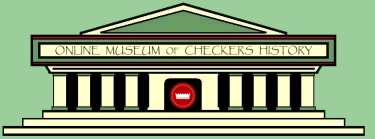
OMOCH, as it is often abbreviated, is the product of the labor of Jay Hinnershitz, Liam Stephens, and Ken Lovell, a trio of checker experts and historians determined to save valuable artifacts of the game of checkers and make them available on the internet to the worldwide community of checker enthusiasts.


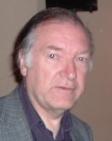
Jay, Liam, and Ken
The OMOCH business model is simple and practical. Contributors submit photos or scans of their checker memorabilia, and OMOCH presents them in an attractive on-line format. Look, for instance, at this incredible photo of a young Gonotsky and an even younger Willie Ryan, with J. G. Finley looking on. It's one of dozens of such exhibits found on the OMOCH web site.

Jay Hinnershitz is the primary architect of OMOCH, and he granted The Checker Maven an exclusive email interview. We asked Jay a number of questions about the museum, its background, its future, and how it came to be. (Jay asks us to point out that the opinions he expresses are his alone and are not necessarily OMOCH editorial positions or the views of the other OMOCH editors.)
What gave you the idea for the Museum?
The forerunners of the OMOCH were my "The History of a Book" and "From Earl Hangen's Scrapbook" posts on the ACF Forum. Earl's entire collection of books, boards, photos, etc. were either auctioned off, or were going to be trashed. I got my hands on most of his collection, and wanted to share with the rest of the checker playing community. I could do this best by posting on the ACF Forum.
By the way, Earl Hangen is a personal hero of mine; not a macho man, never anything more than a very humble, hermit type of guy; but, up until recently, he lived his life in exactly his own way ... the way he wanted to ... what more could any man ask for ??
The idea for the museum began when I kept having trouble posting on the ACF Forum. Something was wrong with Forum, and it was not fixed for several months. Posts were being truncated, and no reasoning was being given. Liam was having the same trouble. I thought about starting a website then, and was kicking the idea around. Then when Kim Willis (the current ACF treasurer) proposed something on the ACF Forum about starting something to replace the recently destroyed ICHF, I just took her idea a step further. The seed was already planted; Kim was the water that made it grow. When Liam agreed, it was full speed ahead.
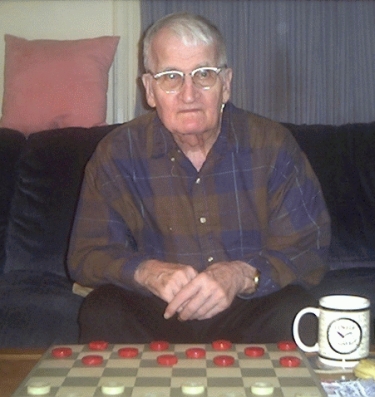
Earl Hangen
What are the Museum's goals?
Just as the slogan says: "Promoting the Future of Checkers and Draughts, by Glorifying its Past !" There is no other site on the web devoted exclusively to this concept (for our version of the game, anyway).
I knew the Beijing games were coming up, and that these games might generate some public interest. I wanted to have available, for anyone interested , the chance to see that, "Yes, the game does have a recorded history."
This will, I hope, help with the notion that there is still some pride amongst the players and/or organizers of the game, to the general public, as opposed to the concept that Schaeffer (architect of Chinook) created with his "Checkers is Solved" campaign, which caused a public and media denouncement of the game.
Checker material is getting harder and harder to find. Did you ever expect to be able to pull together such a large and growing collection, such as you now have online?
I agree that it is getting harder and harder to find Checkers/Draughts related material. I am very proud of the material that the OMOCH has on display. But, I am disappointed in knowing that there are many large collections of historical items out there, but the owners won't display them, either here or anywhere else.
I have statement from one major historian on the game that he , alone, could "triple the contents of the site" and yet would not contribute one single item. And, I have had many promises of items and exhibits, that quite simply, were not kept...so, what are you going to do?
I have more, Ken Lovell has wrote that he has more, and Liam just wrote me that he has several un-opened boxes (!) of material. So, just between us OMOCH Editors, we will have more; but I would still like to see more submissions from the community. Perhaps potential submitters are too modest, or think their items won't be used.
As I stated in the OMOCH submissions page, we are not looking for things of great monetary value, but something that maybe captures a moment in time. And, maybe even a personal Checkers/Draughts related moment in time. Maybe you still have the board you played your first game on ... send it in, we will use it !!

Classic Checker Set
How much time you estimate you spend working on the Museum each month?
I am still, three years after the fact, going through Earl Hangen's collection and finding things to use on the Museum part of the site. I am constantly searching for historical info from my library of books. This, on top of the time I actually spend editing the site, puts me up there in hours. I have had a few down weeks , but for the most part, between 10-15 hours a week. I have already done weekend marathon sessions on the site where I placed 20 hours editing between Friday and Sunday Nights. And,I am always looking for mistakes and correcting them .
Do you get a good audience?
Not the audience I expected; again, there are many I hoped to hear from and (have) contribute.
But, I have heard from the great,great, great granddaughter of Henry Hutzler, the daughter of Rudy Munzinger, the grandson of Fred Vore, the granddaughter of Paul Ottey, the granddaughter of Rex Wood ... this is amazing! People that just googled their ancestor's names, and ended up on the OMOCH, and write me thanking me for remembering the parents, grandparents, etc. This alone makes the effort worthwhile, although the main purpose is to promote the game.
The low point was receiving an e-mail form the official ACF court jester (oh, I am sorry)--- the official ACF appointed website journalist--- condemning the site, insulting the editing and/or editors, and generally "telling me off" as my son, who read the e-mail, explained it to me. Some people, eh?
How do you and your collaborators divide up the effort?
Why ... do you have some spare time on your hands ? (laughs) I have given free reign to both Liam and Ken to do as they please. I rarely, if ever, edit their work, only to correct a typo I might find. And, I have been doing the formatting for the exhibits, and writing the descriptive text.
Liam did almost all of the 1980-2000 Timeline entries himself; Ken made many image and info additions to the earlier timelines. Whatever strikes them, they can do. I am always available for technical help, and if I cannot figure it out, I have my son, who has assisted greatly in this capacity.

What are the directions in which you'd like to take the Museum in the future?
Just keep on going, trying to show the world the history of the game as we know it.
I am concerned. I have read on the ACF Homepage that Charles Walker is planning to start work on the ICHF again. (BTW, it needs to be mentioned that the OMOCH is not affiliated with the International Checker Hall of Fame, although at the launch of the OMOCH, I was forwarded a letter of support from Walker.) I wonder if some are saving their items to donate to the ICHF when it gets up and running, because several that publicly, openly, promised to submit some items never have.
Do you have any thoughts about where the game of checkers is headed?
Without fanatical fresh young American blood, the game could be in trouble over here in America. Definitely, the Internet has piqued the curiosity of some younger players, who have tried it and found out that there is more to the game than "meets the eye," or more than what is portrayed by the news media, i.e., that the game is played by old men, or that it is "solved" --- nothing more to it than a game of Tic-Tac-Toe. This is the result of the Schaeffer publicity campaign, that being that the game is no longer being compared to Chess, it is now being compared to Tic-Tac-Toe.
I have actually heard this stated: "Checkers is played by kids whose parents cannot afford to buy them any more at Christmas time than a two dollar set of checkers." This type of thinking must be changed, or the game's organizations will be in trouble.
Do you have any ideas about how it might be revived?
Yes: we need to make superstars of the young players, make the recognition they receive something that is coveted by all the other young players, such as it is for other celebrity/sports/music etc. superstars. Then more and more will want it ... make being the best player something they all want ! Make the championship something they want!
Look at what Ron King did for the game in Barbados. He is a SUPERSTAR, and the game thrives there because the kids want what he has.
Incidentally, pushing stardom on a youngster could be a problem. One example: last year, I threw some kudos and accolades to young Colton Cardie on the ACF Forum, and immediately, another of the American youth came and threw insults and questioned the legitimacy of Colton's accomplishments, probably jealous of the recognition that Colton was receiving. In my mind, the ACF should have jumped in there and tried to promote a match there between the two. The winner would have had some bragging rights, and that is what this game needs; some fanaticism about playing and winning.
We may, initially in such a campaign, have to compromise certain qualities, and behavior, that is expected from the youth, meaning common courtesy, respect and decent behavior. But, hey, they really don't have these qualities anyway. I don't see a problem with making a sacrifice of something that really does not exist, even within a lot of the "adult" members of the checkers/draughts playing fraternity.
One example of this lack of civility: Ron King's statement that he "is going to destroy Alex" from a few years back. The only thing that actually prevents him from making this statement again is that Alex destroyed him in their two 3-move matches. But it did not stop him from making negative remarks about Kondlo after their Freestyle match last year. If we can excuse the champions for this kind of behavior, then we need to get over the notion that the younger blood, the true "future of the game," has to behave like little angels in order to get support from the game's organization. This I stand behind very strongly !

Tinsley and Langon, Lakeside 1975
Who do you think was the greatest player in checker history?
Marion Tinsley, if for nothing more than his amazing list of accomplishments. More amazing is that he was head and shoulders above all other players at a time when grandmasters roamed the country, looking for tournaments to win. He played them all, and beat them all
The greatest player today?
Alex Moiseyev, without a doubt. In fact, I believe the only thing that prevents him from ever having a chance of being one of the greatest players ever is the lack of serious grandmaster competition available to him.
Do you play a lot of competitive checkers yourself?
Not since my last sojourn into Mail play, in the mid-to-late 1990s. I play on Yahoo occasionally; I play a few crossboard games with Earl Hangen. I enjoy the game as I see it: solving some problems, playing through some games while doing my research for the site and the like. I will, eventually, get to the point where I am content with the OMOCH site, the children will be grown and out of the house, etc. I will then study again, with an attempt at some crossboard tournaments. It will happen, just cannot say when.
Anything you can tell us about Jay the person?
Married, father of two with a step daughter, youngest of nine siblings, Christian, German parentage ,truck driver, musician (drums), artist (pen and Ink fantasy type work), very much American, very much male, checkerist.

The Checker Maven thanks Jay for his extensive commentary. We hope you enjoyed reading about OMOCH and will be inspired to pay a virtual visit soon.
Of course, no Checker Maven edition is complete without a game or a problem, and so we'd like to pass along one of Jay's best. It's a game he played himself, and here's what he has to say about it.
"It is the first game I ever won during my days as a mail player, from 1986. It was contested against Dan McGrath, from the Bethlehem, PA. area, during the 1986 ACF District 3 mail tourney. McGrath was a former American Mail Play Champion, and was well known and respected for many years, by even such as Dick Fortman, who met McGrath at the 1958 US National in Bethlehem, PA.
Anyway, as I played most of my mail games 'cross board' style, most of them went into the wilderness very early ... not that I was trying to lead my opponents this way. I just always (at the time) considered my mail games as practice for the eventuality of my becoming a crossboard player.
I remember showing this to Earl Hangen at the time, and he congratulated me. He wrote me that 'to win a game from McGrath is more than I (Hangen) have ever done, and I have played him many times.'"
Black: Jay Hinnershitz
White: Dan McGrath
11-15 23-19 9-13 22-17 13x22 25x11 7x23 26x19 8-11 27-23 5-9 29-25 9-13 25-22 11-15 24-20 15x24 28x19 4-8 30-26 8-11 19-16 12x19 23x7 2x11 22-18---A
A---22-17 would have drawn.
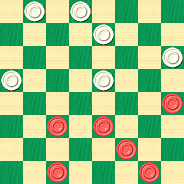
BLACK
Black to Play and Win
B:W32,31,26,21,20,18:B13,11,10,6,3,1.
Visit the Museum first; next, solve the problem; after that, click on Read More to see the solution; and finally, visit the Museum again. There's a lot to see and we're sure you didn't catch it all the first time.![]()
Solution
11-16 20x11 3-7 11x2 1-5 2x9 5x30---B Black Wins.
B---For instance 32-27 30-25 27-23 25-22 31-27 10-14 23-19 22-18 27-24 13-17 24-20 17-22 20-16 18-23 19-15 23-19 and Black wins a man.
Afterwards, Dan commented to Jay, "I didn't know the gun was loaded!"
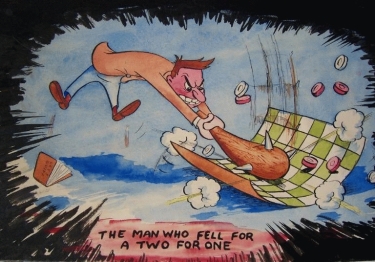
With the exception of the very first image in this article, and the checker problem diagram, all images in this article are used courtesy of the Online Museum of Checker History. See their website for credits to original sources.
You can email the Webmaster with comments on this article.
